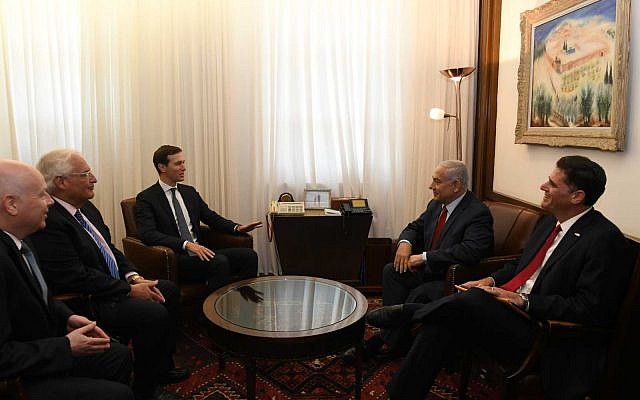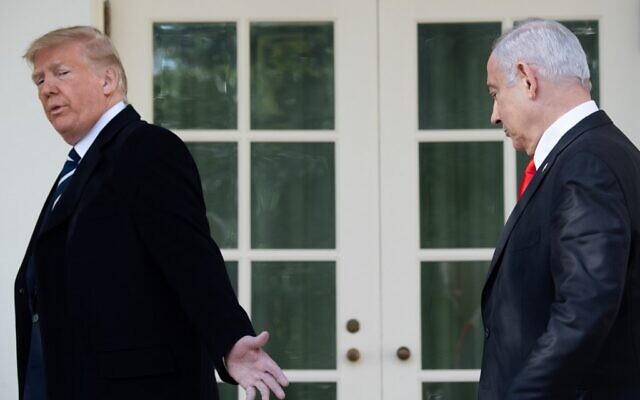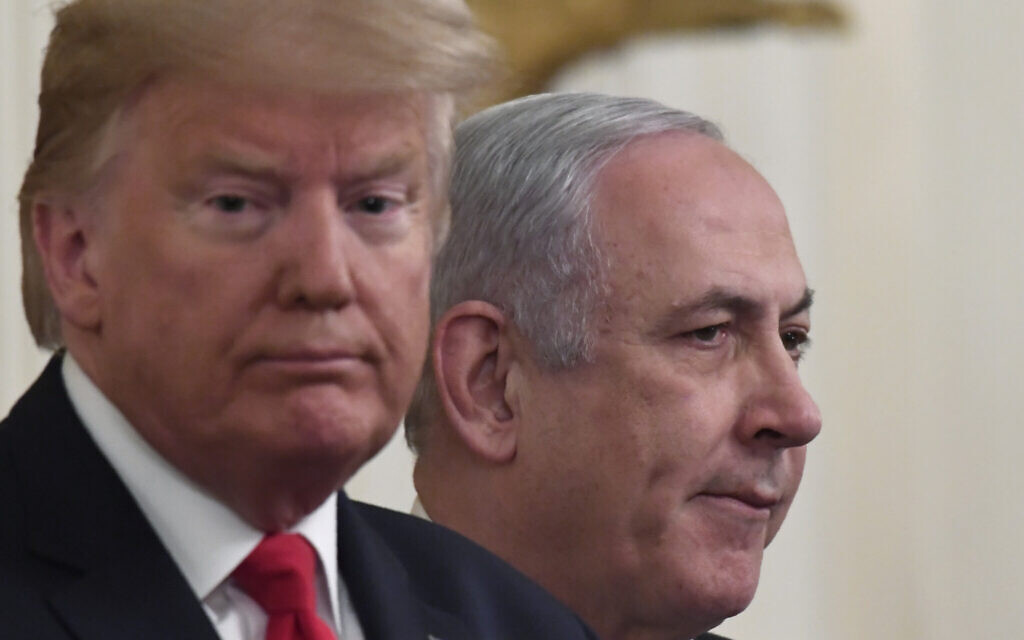T. Belman. I get it. Creating a Palestinian state west of the Jordan R, even with limited sovereignty, is a no, no, with the Israeli right. Why didn’t Kusher get this? If this is such a no no with them why have they not tabled their own plan? What is their alternative? This plan enlarges the Palestinian area but reduces its sovereignty and is heavily conditioned. It was still rejected. I think Bibi is responsible for showing acceptance of this plan and misled Kushner. But after three years in the making and numerous consultations with the Israeli right, surely Kushner knew this.
Could it be that Kushner included poison pills in the plan for both the Arabs and the Israelis to show how futile such a plan is? Maybe he is setting the stage for something totally different.
How did the prime minister’s moment of ‘historic’ triumph in Washington descend into a bitter farce, turn Jared Kushner into a nemesis, and infuriate his right-wing base?
By SHALOM YERUSHALMI, TOI Today, 10:45 am
US President Donald Trump, left, and Prime Minister Benjamin Netanyahu during an event in the East Room of the White House in Washington, January 28, 2020, to announce the Trump administration’s plan to resolve the Israeli-Palestinian conflict. (AP Photo/Susan Walsh)
Prime Minister Benjamin Netanyahu will have had many long hours for contemplation during his flight Monday to Uganda.
How did it come to pass, the prime minister will likely have agonized, that he could deliver such a climactic crescendo in Washington, only to awkwardly stumble days later?
Why did he vow so publicly that he would immediately start to apply Israeli sovereignty to the Jordan Valley and all settlements in Judea and Samaria in a cabinet meeting that was supposed to have taken place on Sunday, only to have to swallow the bitter pill and cancel that meeting, because he could offer no annexation plan for the ministers to vote on — and couldn’t even be sure he had a majority among ministers from his own Likud party?
How did so much optimism turn to such bitter disappointment for the right?

Prime Minister Benjamin Netanyahu speaks at a Likud party campaign event at the International Convention Center in Jerusalem on January 21, 2020. (Olivier Fitoussi/Flash90)
Just last week, he was sitting in Blair House with all the heads of the Yesha Council, the umbrella advocacy group for West Bank settlements, who had come to Washington to support him. He convinced the settlers that this was the best plan for everyone.
And now the chairman of the Yesha Council, David Elhayani, says the entire plan — which Netanyahu has worked on with the Americans for three long years and which was supposed to get Likud voters out to the ballot stations and grant him a decisive victory in the elections — is actually kalam fadi, or “empty words” in Arabic, and should be “thrown in the trash.” No less.
What’s a prime minister to do? The only option left that could rescue Netanyahu from his self-made nosedive with the right and the settlers, and rescue his election prospects, is to annex something
It is hard to overstate the melancholy on the ideological right. The rhetorical spectrum runs from “despair” and “disappointment” to “lies” and “deception.” Netanyahu is hearing these mutterings in Likud as well.
No one is speaking openly yet, because no one wants to confront the prime minister, who is still the unassailable king inside Likud.

Prime Minister Benjamin Netanyahu speaks at a Likud party rally in Tel Aviv on November 17, 2019. (Tomer Neuberg/Flash90)
But privately, no one understands how Netanyahu ended up failing so spectacularly: how, despite his intimate working relationship with President Donald Trump and the US administration, and despite his promises of annexation, he is now in a desperate search for some half-decent strip of territory to which he can apply Israeli law before election day on March 2 – because the alternative would constitute one of the more resounding political farces in Likud history.
Netanyahu will likely have done some introspection on the flight to Uganda – and also some political calculus. What does he do now? He could bring the “deal of the century” to the cabinet and try to squeeze it through with a majority vote, but that would require enormous efforts on his part to pressure and cajole ministers from his own Likud party. They’re all spooked by the Palestinian state that lies on the other side of the equation put forward by Trump and Jared Kushner.
Ironically, Netanyahu’s fall this time came in the very area that is usually his greatest strength: marketing. All his explanations and protestations that the Palestinian state contained in the plan is merely “limited and conditional sovereignty” that is unlikely ever to coalesce into a state aren’t convincing his fellow Likud members. His many years of demonizing the very idea of a Palestinian state are now coming back to haunt him. No minister wants to see this “state” acquire 70 percent of Judea and Samaria, with Israeli enclaves inside it.
“This plan is bad for Israel,” one Likud minister told The Times of Israel’s Hebrew-language sister site Zman Israel on Sunday. “It has anti-rightist paradigms – this Palestinian state, the tunnel connecting Gaza [to the West Bank], the territory in the Negev [annexed to the Palestinian state], the capital in East Jerusalem.
“You’re talking to me about handing the neighborhoods in Jerusalem beyond the security fence to a Palestinian state? What is that? Take Shuafat – it lies between French Hill and Pisgat Ze’ev. What do we want to happen there? We want rockets on those two neighborhoods? That’s worse than the shooting at Gilo during the Second Intifada. It’s much closer.”

The Shuafat neighborhood in East Jerusalem. (Miriam Alster/Flash90)
Netanyahu may be able to pass the plan through the cabinet with the help of the ultra-Orthodox parties and some of the moderate Likud ministers. A quick calculation would put the group of possible supporters at 14 votes out of the 25 cabinet ministers in the current caretaker government. But the very fact that he would face vocal opposition in his own cabinet, from his own party members, would render the exercise politically useless. So he has given up on forcing such a vote.

Foreign Minister Israel Katz at a Likud election campaign stop in Jerusalem, September 16, 2019. (Yonatan Sindel/Flash90)
The key figure in these calculations is Foreign Minister Israel Katz, who is still considered a close ally of Netanyahu. Katz opposes the plan and will vote against it if it comes up in the cabinet. That alone ensures that no other major Likud figure looking to position themselves as a future heir to Netanyahu can afford to face the next Likud primaries with the stain of having voted in favor of a Palestinian state in the heart of the country – no matter how comically limited that state would be.
It’s been clear since Netanyahu’s jaunt to Moscow last Thursday after the spectacle in Washington that he has stumbled into an impossible situation. On Sunday evening, he showed up at a big family event for MK Miki Zohar, spoke for three minutes and then fled the scene. Anyone who spoke with the hundreds of Likud members who packed the event hall at the Doria compound east of Ashkelon heard the Trump plan referred to as “diplomatic sabotage.” And Israelis’ confusion is only growing.
One of the questions that has most vexed the disappointed Likud ministers in the days since Netanyahu promised them that annexation would begin this week concerns Ambassador to the US Ron Dermer.

Prime Minister Benjamin Netanyahu (2nd from right) meets at his Jerusalem office with the ambassador to the US, Ron Dermer (right); White House adviser Jared Kushner (center); US Ambassador David Friedman (second left); and special envoy Jason Greenblatt, on July 31, 2019. (Kobi Gideon/GPO)
“There’s something crazy going on here,” one minister told Zman Israel. “Dermer is Kushner’s best friend. They do everything together. So what happened here? How did Kushner flip on him and on us so abruptly?”
It was, after all, Kushner who last Wednesday declared flatly that the US would not support any Israeli unilateral annexation of West Bank territory until Israel has a properly functioning government after the March 2 elections — contradicting US Ambassador to Israel David Friedman, who had said on Tuesday that there was no impediment to immediate annexation. And it was Kushner who turned the screw still further by saying over the weekend that one of the goals of the deal was to ensure that Israel not expand its settlements any further.
What’s a prime minister to do? The only option left that could rescue Netanyahu from his self-made nosedive with the right and the settlers, and rescue his election prospects, is to annex something, and not just little Kfar Etzion or Oranit, but a significant stretch of land. The Americans would have to absorb the pressure from their Arab allies that would result from such a move – if only Netanyahu could be certain that even that would help.
No one is speaking openly yet, because no one wants to confront Netanyahu, who is still the unassailable king inside Likud
Actually, “his only real hope is to convince President Trump that a significant unilateral annexation would help Trump himself in the coming US presidential election,” one senior Likud minister said. The political pressure will now be turned on American Evangelicals.
The Israeli right believes that only they, Trump’s most important base, can force the American president to greenlight a significant Israeli annexation of West Bank settlements. Evangelicals are not interested in a Palestinian state – only in a Jewish state in the land of Israel, given to the Jews by God in the Bible. Massive pressure from them, Netanyahu hopes, might force Trump’s acquiescence.

US President Donald Trump walks with Israeli Prime Minister Benjamin Netanyahu down the West Wing Colonnade as he arrives for meeting at which he set out the US peace plan, at the White House in Washington, DC, January 27, 2020. (SAUL LOEB / AFP)
“If that happens, we can argue that this is a historic moment of opportunity, and get an okay from the attorney general,” the Likud minister said, referring to Attorney General Avichai Mandelblit’s repeated remonstrations to ministers not to advance major policy initiatives under the current caretaker government.
“In any other situation, the attorney general would oppose annexation, and then it’s all lost,” the minister added, brushing his palms in a gesture of defeat.




Bibi accepted the plan because it has benefits for Israel.
Also he clearly knows and I have heard him speak about this very recently that the Abbas would say no and would never ever be able to meet the conditions to even commence negotiations. So he was agreeing to take a practical win and ONLY in theory NOT in the real world agree to a Pal State or more aptly called self-governing area.
There are four choices the Pal-Arabs live in Judea/Samaria:
1 Help Some Voluntarily Move with incentives (not in the mix yet in a real way)
Drive OUT or destroy Terrorists in conjunction. Allow those who agree to be
loyal to Israel to become residents after security criminal checks.
2. One State Solution with a couple million more Pal-Arab residents of Israel.
3. Self-Governing Area for Pal-Arabs (Municipal Level Control) such as the PA is
currently. Trump’s plan has this but requires democracy and demilitarization
including Gaza
4. Israel re-control all of Judea/Samaria & Gaza and rule over Pal-Arabs.
@ Adam Dalgliesh: This is no longer my view.Smotrich, Netanyahu and Caroline Glick have persuaded me that a declaration of sovereignty over the settlements and the Jordan Valley would be useful to Israel, even though it might lead to intensified terrorist attacks on Israelis by the increasingly desperate Palestinian terrorist regimes.
An analysis in today’s TOI claims it will be extremely difficult for either of the two main parties to form a government after the March election. A fourth election possible. “Even with the support of Liberman, Gantz would likely need defecting lawmakers from the right-wing bloc to form a majority government or the external support of the predominantly Arab Joint List for a minority government.
Despite Liberman’s support, Gantz does not appear to have a path to a government unless his party surges dramatically in the March 2 vote, as the Joint List said that it would not back him unless he rejects elements of the Trump peace plan. Gantz, earlier this week, said his government would not extend an invitation to the Joint List — which has never sat in a coalition. The Joint List also ruled out sitting in a government with the right-wing Liberman.”
https://www.timesofisrael.com/right-wing-religious-parties-renew-pledge-to-back-netanyahu-as-pm/
The author’s fallacy is thinking that the plan and Bibi’s favorable comments about it are likely to affect the outcome the coming election. The Israeli person in the street, unlike the politicians knows that the Arabs will not accept the Trump proposal, and that it will have no impact on their lives as a result. They also know that an Israeli declaration of sovereignty over certain areas in Judea-Samaria will have little impact on their lives if they don’t live in Judea-Samaria.. Even its impact on most settlers won’t amount to very much unless the Israeli government follows up the declarations with concrete actions. And the settlers have learned to be cynical about their government actually following up on its promises with action.
To summarize, the Israeli public knows that proposals and declarations are meaningless unless they are acted upon. Otherwise they are just background noise and hot air generated by politicians. As a result, the current flurry of proposals and proposed actions won’t affect how they vote.
Like his white face version of Al Jolson singing ‘mammy I need your help,’ I thought they was my buds now their ganging up on me. Lets take an early spring break and visit Uganda.